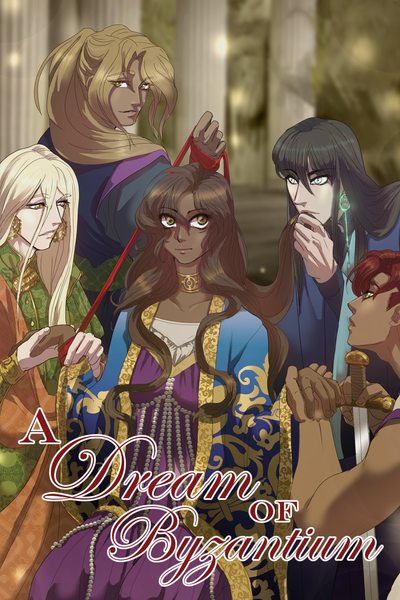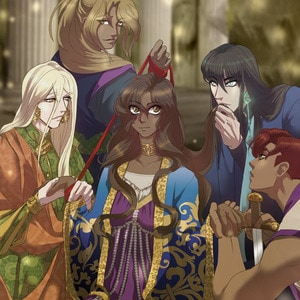The game they played was simple in set up, but rather elaborate in execution. Given that her accent would pass for a native speaker, Ophelia would bring different characters to life in front of the envoys that crossed the villa’s gates. They’d pick and choose based on who the person going through the gate was, and how well informed he’d be on who was working for Hyperion. It wasn’t meant to be a long-running strategy, just something that gave them the upper hand while Ophelia’s abilities were not as well-known. It was a perfect opportunity to gain information and favour from the people who came in ready to try and thwart the Chaldean's business.
When she wasn’t seeing to guests, she was receiving lessons from Lyra or Diana, two of the head maids of the villa who also happened to be well-educated orators. They’d been taught in the academies of the Free Cities as daughters of wealthy gentry, but after their families had lost their standing due to political upheavals, they’d made their money through manual labour. They told her about the different kingdoms, empires and principalities; geography and history were their main subjects. She used their lessons to more confidently create the personas she was playing; a more elaborate version of what she’d done in Caudiceum with her pretend-play of being an Iceni princess.
Armed with her knowledge, she knew that deep in Arqan culture there was a natural mistrust of Chaldeans, who were seen as money-hungry scammers. That a man like Hyperion would rise so high would be seen with some reserve by an Arqan of certain predispositions, as it was the case with the man they were to host for the afternoon.
On her way to the western garden she traded robes for a shirt and a small skirt of linen, which were embroidered with the traditional patterns of the region. She took a small bucket, and some iron shears, and walked over to where four fig trees surrounded the intersection of two paths. A fountain stood in the middle, offering to the wanderers the serene view of beautiful lotus flowers floating in the water. She heard footsteps approaching hurriedly, and began to angrily look through the figs hanging from the trees, pretending she was trying to select some for picking.
“Of course he’d have to ask for figs today,” she talked to herself in a frustrated Arqan. “It’s not even the season yet, but for him they of course have to be fully mature. Prick.”
She picked one of the fruits and threw it none-too-gently in the bucket. The footsteps were now closer to her. “A maid to a Chaldean… my old ma would be furious if she saw me!”
A laugh stopped her. “An understandable emotion, lady.”
Ophelia turned around. An older man dressed in a heavily decorated red kaftan and cream-white pants was making gestures for her to get closer. “I heard that the master of this place kept very few Arqans in his staff,” he said in a whisper. “He doesn’t quite like us, does he?”
“In this city we suffer no fools, do we? And he’s a sly one, he doesn’t bother with niceties. It’d be easier to like rotten fish than him, I say.”
“Have you been working here for long?”
“A few weeks. I’ve picked up a language or two as me da was a sailor, and I heard he was looking for a translator. But it turns out he just wants a maid!”
Ophelia frowned. “Are you a city principal? I see you have the Arqan coat of arms,” she pointed to the man’s chest, where a heavy chain of gold showed his status.
“I am, child,” he said with pomp. It seemed like bureaucracy was one of those constants regardless of time or space. “I’m here on official business.”
“Hope it’s to get some money out of this fox.”
The man winked. “Hopefully. The Tripartite Council is upon us and we need some, uh, help with the expenses. We’re counting on the generosity of this city’s most illustrious gentlemen – and between the two of us, we could do with them paying back for our generosity.”
“Aye, right you are on that, sir. But I should warn you he’s been complaining all week about the new tax – he’s not going to be too interested in dishing out more money for the city.”
“Tax? You mean the new levy on tin and lead?” Ophelia nodded. “Of course he would be. These Chaldeans, they’d rather sell their mothers if that meant they didn’t have to pay tax.”
“I see it every day,” Ophelia sighed and got closer to the man, looking around them to see if anyone was around. “But sir, if I may, and this is purely the concern of one who was born and raised in this city, and has to see leeches like him come over and make their fortune out of the generosity of this port; this Chaldean has found a way around the wisdom of the Preceptors. I was asked to talk to one of the Axiam advisors; their intention is to change the route of the tin and lead so that it’ll enter through Siam and be carried through caravan into Arqa. This way, the levy won’t be applicable since the origin port is the city, not Axium.”
“That’s outrageous!” The man blanched, and Ophelia made gestures for him to quiet down. “Sending it through caravan? That’s not possible! It’s too dangerous, and it takes too much time!”
“I heard mentions of the Nabatean kingdom, sir. I’m not sure what they agreed with them…”
“If they used their rivers it’d be more feasible, but still a mad enterprise… they’ve been at war for ages,” the man cleared his throat and composed himself. “Well, never mind all this. Perhaps we’ll lend them some more rope to hang themselves with. But this is good to know; I commend you for your loyalty to the city.”
Ophelia bowed her head. “I better get on with this meeting,” the bureaucrat said to himself. “Perhaps I shall see you later. Have a good day, if I don’t.”
And she did see him later, when she was called in to sit next to Hyperion to act as a mediator between the two. She’d come in with the refreshments: fresh figs and fig chutney to be spread on cheese and flat bread, as if to underscore the character the city representative had seen earlier. She practised her familiarity with the man when they spoke; she dropped little innocent jabs at Hyperion as if she and the Arqan were old time friends who had a lot of inside jokes to share with each other. She made him think that she was on his side; what Hyperion spoke, she added bits and pieces to.
Finally, he went away: Hyperion had agreed to contribute to the Council only if he got a yearly relief on the tin and lead taxes, and a seat on the forum – something that would give him access to all the representatives that were coming in to take part, an excellent opportunity for a merchant to close new deals.
“What do you think?” Hyperion asked Ophelia as they both watched the man depart.
“He thought the route change idea was outrageous, but seemed to think it was plausible.”
Ophelia wasn’t entirely sure of the size of the five-dimensional play that the merchant was trying to pull, but as far as she’d been briefed, it involved making the City believe he’d collude with the Axum merchants to create an alternative trade route.
Arqa and the other Free Cities had made their fortune and power from several big trade routes. It was a natural mid point for the networks that carried goods from the east into the west, and also served as the last stop for the caravans that crossed the desert bringing wares from the southernmost kingdoms in the region. All sorts of raw materials and manufactured goods passed through their shores, but a significant part of their economy relied on metals produced in the south (tin, lead, bronze and iron) and textiles (particularly, silks and cotton).
Hyperion’s network used Arqa mostly for the metals and some manufactured household goods, however, this constituted a small portion of his overall trade. A larger portion of his business relied on fine silk textiles, none of which ever saw the Arqan port, as they were brought entirely through land routes. His fiercest competitors relied on the cheap manufacture and taxes of the caravans that used Arqa to bring the goods north.
His final game, then, was to coax the city authorities to believe he was fuming over the tin and lead tax, and use that as a way to manoeuvrer them into increasing taxes that would disproportionally affect the competition that worried him the most: those who used the caravans to move goods into the port. It wasn’t something that a simple conversation with one city official would solve, however; Ophelia had been told that the game would be slower, and required feeding the wrong information to the right people at different times.
“I’m sure he’ll babble on to his friends,” Hyperion said with a smirk. “Now, we let the rest do the work.”
“The rest?”
“Customs officers, advisors, jurists… if you drop some influence here and there it’s easier to manufacture a certain version of reality,” he answered. “It’s not enough for one person to say it; multiple mouths have to say something similar.”
“What if nothing happens?”
“It will,” Eon commented. “We have jurists we can pay off to introduce the proposals.”
“But it’s better to make it seem more natural,” Hyperion clarified. “So that when they bring it to the forum, it’ll not seem such a novel idea.”
To Ophelia, it had seemed like she’d switched genres. With Phobos, it all felt like an epic adventure movie; with the Chaldean merchant, it was more like one of those political dramas. “Lobbying,” she said in her native English. “That’s how we call it back home. Comes from standing in the antechamber of the forum waiting to ask one of the preceptors for favours.”
Hyperion rose from his seat, tightening his tunics around him.
“How dreary,” he commented, walking slowly towards the gardens, “the idea of having to parade around those dry bureaucrats. Should we prepare for dinner?”
A week later, the man in the red kaftan and the pompous city seal came back. He was, however, in the company of someone who Hyperion held in higher esteem: the city’s Lord Protector, which Ophelia had come to understand was a function not too dissimilar to a governor.
“He’s no fool, that man,” the merchant had said to Ophelia during breakfast. “He knows that to be competent at his job there’s a certain level of functional corruption he must abide by; everything else should be pure honest work. As such, he makes sure to keep the big ships like me in check. I have no doubts he’s come to sniff out what I’m up to this time.”
With that warning in mind, Ophelia prepared herself to search for unspoken tensions in an otherwise cordial meeting. The initial greetings were pleasant: the merchant had received the two politicians in one of the gazebos in the garden with nothing but smiles.
Blossoming cherry trees surrounded them: the delicate pink petals quivered as the wind blew, charmingly falling onto silk or cotton as they looked for somewhere to rest. The servants had prepared some fragrances, which they’d left burning in the censors that hung from the delicate iron structures of the gazebo. It was all an inviting, alluring set up: a feast for the eyes, another for the sense of smell; as the refreshments were brought one could hear the song of birds in the distance, and that covered the other two senses that could be entertained in such occasions.
On their side, herself and Eon stood to either side of Hyperion; on the other’s, a scribe had been brought, and had been given a small stool to sit on while he took his notes.
“I wish I could’ve come to see you sooner,” the Lord Protector said once they had exchanged the initial pleasantries. “I’m keen to ask you about the events at Caudiceum. With the Council approaching, it has set a very concerning stage for us.”
“Ah yes, the Phrygian matter. Eon, whatever came to be of that? We heard that two of the men who’d come into the city with the victims had been escorting an Iceni woman. The lords at the forum were quite nervous when she declared.”
“Who wouldn’t be? Those savages will look for any excuse to attack,” the bureaucrat in the red kaftan commented with a snort.
“The Phrygian envoys arrived three days after we left, sir,” Eon answered his master. “Caudiceum opened its borders again, and it seems like no other suspects have been found. The Phrygian diplomats are claiming it was a politically motivated crime: the victims were supporters of the current king.”
The Lord Protector leaned forward, hand pensively stroking his long beard. “This civil war is spilling everywhere, isn’t it? I’ve got Deimos and Ulysses sending me missives every couple of days asking me what we should do. We’ve got a bad stew brewing here… You know we have plenty of rebel Phrygians here, in Philistia and Latil the same.”
“They came here for a reason,” Hyperion commented. The governor barked out a laugh.
“Indeed. They will find plenty of sympathy. No one wants to end up under Elysian boots; the Lord Sun knows we’ve managed to escape their grip so far, but I fear this situation will end up spilling into this side of the pond, forcing us to take sides.”
The merchant decided to draw a line. His indifference came through with simplicity:
“A difficult political situation to be in, I’m sure.”
This earned him a smirk from one man, a scandalized stared from another. Behind them, the scribe wrote away.
“How many Phrygians do you know in the city?” the Lord Protector cut to the chase, but didn’t care to hear a response. “Tell them to quiet down during the council, or else I’ll personally kick them out. I’m ceasing all distribution of ore for weapons in the week leading to the arrival of the envoys. Thought you should know. I’m not taking any risks.”
“How cruel of you. This poor merchant wants to keep eating his pomegranates.”
“You want a tax relief? I’ll give you that for a year.”
“Five years.”
“We might not be here then,” another dry laugh. “You have access already to the envoys; make something happen so that you don’t have to worry about your business after this year.”
Hyperion’s face soured, but he nodded. “It’s just for a couple of weeks,” said the Lord Protector in a tone that intended to be pacifying, but felt more patronizing than anything. “That is, unless we run across some issues…”
“I’ll talk to the few folk I know,” the merchant replied dryly. “Hopefully they’ll listen.”
“Everyone listens to the folk with the singing pockets.”
The politician’s eyes then sharply focused on Ophelia; it was clearly he was the type of man not to beat around the bush, and only do what he had set out to do. “I hear you have a translator, a new one. What can she speak?”
“Arqan, Drusi, Iberian and Elysian,” Hyperion quickly replied. “Quite the combination, isn’t it?”
“Indeed,” the man assessed Ophelia, and whatever he searched with his gaze he seemed to have found, as he reclined back contentedly. “Lend her to us for a few weeks. We’re running low in interpreters.”
“I’ll be glad to,” Hyperion replied flatly, although it was clear the ask was not welcome, “as there will be little trade to do then anyway.”
The Lord Protector didn’t seem to care. Shortly after that their conversation ended, and the two men went back the way they came.











Comments (0)
See all